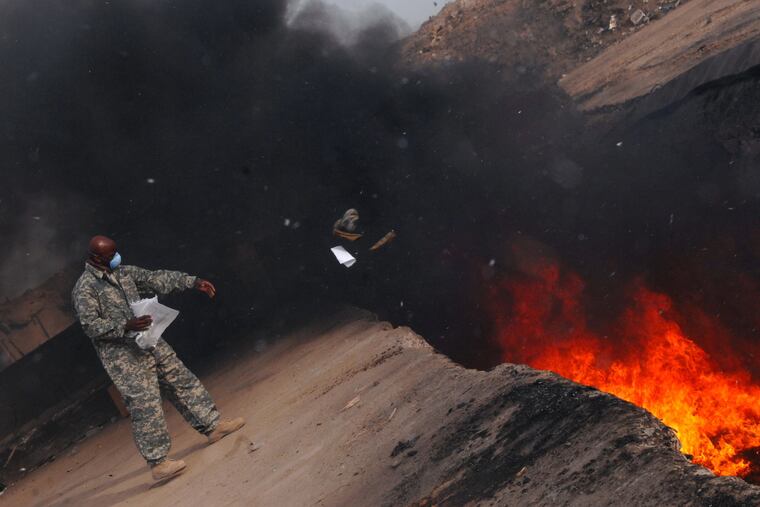Toxic burn pits made veterans sick. Don’t block their access to care.
We owe it to every service member and veteran to provide them with treatment for the toxic exposures they have experienced in service of the United States.

“Diseases don’t wait and neither should the efforts to address them.”
Those are words from one of the bravest men I knew, the late Staff Sgt. Wesley Black. In 2021, we lost Wesley to colon cancer that was caused by exposure to burn pits — the trash burning sites that were commonly used during the wars in Iraq and Afghanistan. He was only 36 years old.
As a Navy veteran and a veteran organization leader, my fight against burn pits — and the toxic fumes they emit — has been driven by my respect for veterans like Wesley who left behind a legacy of championing the rights of service members who were exposed to toxins. As more people join the fight against burn pits, from policymakers to individual activists, our collective efforts have given way to the Sergeant First Class Heath Robinson Honoring Our Promise to Address Comprehensive Toxins (PACT) Act. The act provides service members who have suffered toxic exposures access to critical health care and disability benefits that they’ve been denied in the past.
The fumes from the plastics, military equipment, human waste, and other materials that were disposed of in burn pits — some of which covered acres — have been linked to respiratory illnesses, autoimmune disorders, and rare cancers. Honoring our collective responsibility to care for our veterans is not a divisive matter. However, 13 senators voted against this landmark legislation. Pennsylvania senators, specifically, are split on the issue.
Republican Sen. Pat Toomey voted against the bipartisan PACT Act. Democratic Sen. Bob Casey voted in favor of the bill.
The bill will be returning to the Senate floor after the broad and bipartisan 342-88 House vote on July 13 to pass the amended language. The upcoming Senate vote is crucial in supporting the approximately 3.5 million veterans of the post-9/11 wars who’ve suffered toxic exposures from burn pits. The PACT Act provides benefits to Gulf War veterans as well as many Vietnam veterans who have been left behind.
To the nearly 759,000 veterans and almost 2,000 active duty service members who call Pennsylvania their home, the split vote between the Pennsylvania senators could cost them dearly.
As if that wasn’t enough, Toomey proposed an amendment to the PACT Act which arbitrarily limits the amount of funding that Congress believes should be spent each year for the next 10 years in support of veterans exposed to toxins.
As drafted, this amendment leaves open the possibility that in order to provide sufficient funds for veterans’ health and benefits, additional funding may end up coming at the expense of other critical veteran care programs or even other agencies.
So I ask Toomey: Are you really putting a price limit on our nation’s promise to care for the brave Americans who have risked their lives to fight for our country?
And there continue to be lives on the line. According to Iraq and Afghanistan Veterans of America’s (IAVA) 2022 member survey, 82% of veterans who served in Iraq and Afghanistan have been suffering the consequences of burn pit exposure and/or airborne toxic materials during their years of service. And about half (49%) of those exposed believe they have symptoms associated with the exposure.
The fight against burn pits has large bipartisan support from more than 30 Republican senators. Those GOP senators had it right: We should prevent any more unnecessary loss of life and spend what it costs to provide the care outlined in the PACT Act.
» READ MORE: I’m a veteran. Getting help with my mental health changed my life.
When our service members made the decision to join the military, they knew that they would face countless dangers as they worked to protect our great country. However, being denied health care from their own lawmakers was one I doubt ever crossed their minds.
Toomey’s opposition caused a giant obstacle to the biggest congressional push for veterans’ health care in many years.
We owe it to every service member and veteran to provide them with treatment for the toxic exposures they have experienced in service of the United States. They have done their duty, now it is time for us — the beneficiaries of their sacrifices — to do ours.
Jeremy Butler is a Navy veteran and the CEO of the Iraq and Afghanistan Veterans of America.